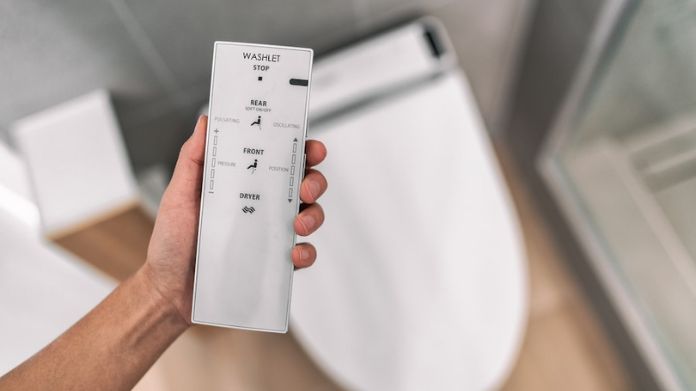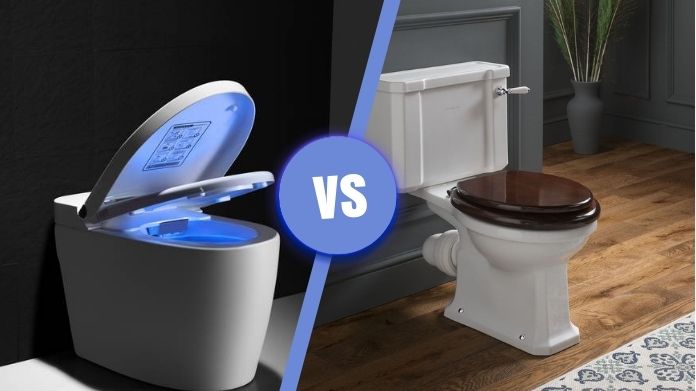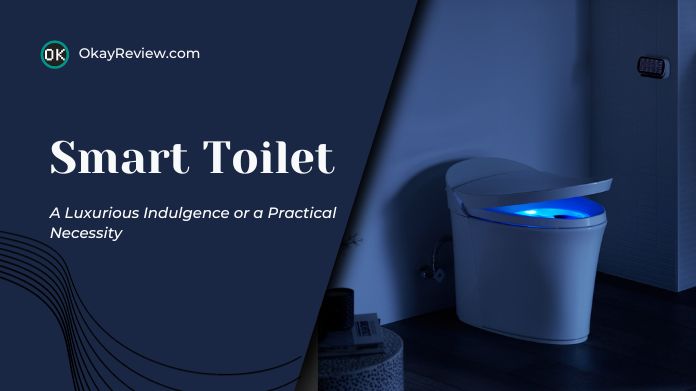Technology has revolutionized every aspect of our lives, and the humble bathroom is no exception. Enter the smart toilet, a marvel of modern engineering that redefines our most basic household fixture.
But what is a smart toilet? It’s a sophisticated blend of technology and convenience designed to enhance the personal hygiene experience.
In this exploration, we delve into smart toilets’ intricate features, numerous benefits, and potential downsides.
From automated flushing to self-cleaning capabilities, smart toilets offer a glimpse into the future of personal care.
However, as with any advanced technology, they come with considerations such as cost and maintenance.
Join us as we unravel the complexities and conveniences of smart toilets, helping you decide whether this high-tech bathroom upgrade aligns with your lifestyle.
Table of Contents
What is a Smart Toilet? A Technological Revolution in Personal Hygiene
A smart toilet represents a technological revolution in personal hygiene, redefining the traditional bathroom experience.
But what is a smart toilet? It’s an innovative fixture integrating advanced technology to enhance cleanliness and convenience.
A smart toilet offers a touch-free, hygienic solution to everyday bathroom needs, such as automatic flushing, bidet functions, self-cleaning capabilities, and heated seats.
It’s designed to provide an eco-friendly approach by reducing water and toilet paper consumption.
A smart toilet caters to comfort, hygiene, and environmental consciousness, ideal for modern homes, making it a smart choice for those looking to upgrade their bathroom with cutting-edge technology.
Key Features of Smart Toilets
 Smart toilets, a remarkable innovation in bathroom technology, bring many advanced features to your personal hygiene routine.
Smart toilets, a remarkable innovation in bathroom technology, bring many advanced features to your personal hygiene routine.
But what is a smart toilet exactly? It’s a high-tech commode with various functionalities that go beyond the basics of traditional toilets. Key features include:
- Automated Flushing: Smart toilets offer hands-free flushing, enhancing hygiene and convenience.
- Self-Cleaning Technology: They typically include self-sanitizing functions, reducing the need for manual cleaning.
- Bidet Functions: Integrated bidet features provide water cleansing and are adjustable for temperature and pressure, ensuring a thorough and personalized cleaning experience.
- Heated Seating: Say goodbye to the discomfort of cold toilet seats with adjustable temperature settings for added comfort.
- Touchless Lid Operation: Motion sensors enable automatic opening and closing of the toilet lid, minimizing contact and promoting a germ-free environment.
- Deodorizing Systems: Smart toilets often have built-in deodorizers to keep the bathroom fresh.
- Eco-Friendly Design: They are designed to use water efficiently, contributing to environmental conservation.
Benefits of Having a Smart Toilet in Your Home
Installing a smart toilet in your home brings numerous benefits, elevating your bathroom experience to new heights.
But what is a smart toilet, and why consider it for your house? A smart toilet is an advanced bathroom fixture that combines technology with comfort and hygiene.
Here are the key benefits:
- Enhanced Hygiene: Smart toilets offer touch-free flushing and self-cleaning features, significantly reducing the spread of germs and bacteria.
- Eco-Friendly: These toilets are designed for water efficiency, contributing to environmental conservation by using less water per flush than traditional toilets.
- Personalized Comfort: With amenities like heated seats and adjustable bidet settings, a smart toilet provides a tailored bathroom experience.
- Convenience: Automated features such as lid opening and closing and air drying add convenience that traditional toilets can’t match.
- Improved Accessibility: For those with mobility challenges, the hands-free operation and customizable settings make smart toilets a practical choice.
- Odor Control: Built-in deodorizers in smart toilets help maintain a fresher bathroom environment.
Potential Downsides and Considerations
While the allure of a smart toilet is undeniable, it’s essential to weigh potential downsides and considerations. What is a smart toilet without a look at its full picture?
Here are some aspects to ponder:
- Cost: The initial investment for a smart toilet is significantly higher than that for a traditional toilet. This includes both the purchase price and installation costs.
- Complexity in Repairs: With advanced technology comes complexity. If a smart toilet malfunctions, repairs can be more complicated and expensive than standard toilets.
- Electricity Dependency: Unlike traditional toilets, smart toilets require electricity to operate their advanced features. This could be a concern during power outages.
- Technology Overwhelm: For some, the high-tech nature of smart toilets can be overwhelming, especially for those not tech-savvy or guests unfamiliar with how to operate them.
- Water Pressure Requirements: Certain features of smart toilets, like the bidet function, may require higher water pressure than what is available in some homes.
- Space Considerations: Some smart toilet models can be bulkier than traditional ones, potentially posing a challenge in smaller bathrooms.
Comparing Smart Toilets with Traditional Toilets
 When comparing smart toilets with traditional toilets, it’s essential to understand what a smart toilet is and how it differs from its conventional counterpart.
When comparing smart toilets with traditional toilets, it’s essential to understand what a smart toilet is and how it differs from its conventional counterpart.
A smart toilet is a high-tech version of the regular toilet, equipped with features like automated flushing, bidet functions, self-cleaning, and seat warming.
These features offer enhanced hygiene, comfort, and convenience, setting smart toilets apart from traditional models.
Traditional toilets, on the other hand, are known for their simplicity and lower cost. They require manual operation and lack the advanced technological features of smart toilets.
While smart toilets are more energy-efficient and offer a higher level of hygiene, they also come with a higher price tag and depend on electricity, which could be a drawback during power outages.
In contrast, traditional toilets are more affordable and less complex, making them easier to repair and maintain.
Making the Choice: Is a Smart Toilet Right for You?
Deciding if a smart toilet is right for you involves considering what a smart toilet offers and how it aligns with your needs.
A smart toilet with advanced features like automated flushing, bidet functions, and self-cleaning offers enhanced hygiene and convenience.
It’s ideal for those prioritizing modern comforts and eco-friendly living. However, the higher cost, reliance on electricity, and potential complexity in maintenance are important factors to weigh.
A smart toilet could be a perfect fit if you value technological innovation in everyday living and are willing to invest in long-term benefits. Traditional toilets might suit those who prefer simplicity and lower upfront costs.
Takeaway
Smart toilets represent a significant leap in bathroom technology, offering unparalleled hygiene and convenience. While they come with higher costs and potential maintenance challenges, their benefits can make them a worthy investment for those seeking the ultimate bathroom experience.

